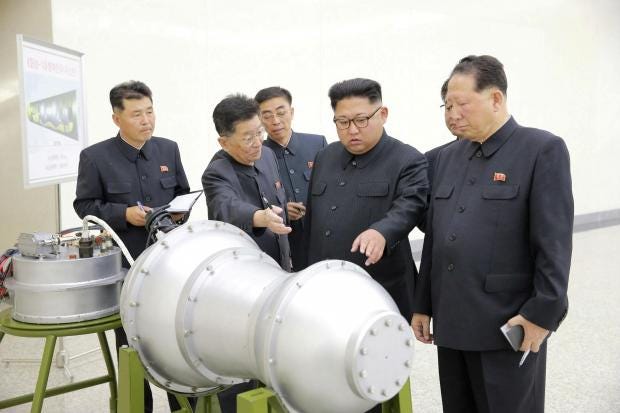Threat
of nuclear catastrophe 'at highest level since Cold War'
At
an annual conference designed to prevent nuclear disaster, speakers
express concerns over the US President's stance on Iran and North
Korea

9
October, 2017
The
threat of a nuclear catastrophe is higher now than at any time since
the most tense days of the Cold War, a leading international think
tank has heard. Plummeting US-Russia relations, threats from
terrorists and rogue states and, significantly, the behaviour of US
President Donald Trump are key factors.
Mr
Trump’s shadow loomed over the 10th-anniversary conference of the
Luxembourg Forum with speakers expressing grave worry over Mr Trump’s
avowed aim of scrapping the landmark nuclear deal with Iran and his
repeated public threats to annihilate North Korea.
The
failure of Washington and Moscow to negotiate on their nuclear
arsenals amid a series of geopolitical confrontations ranging from
Ukraine to Syria has created uncertainty and instability, the meeting
in Paris was told. But it was impending action by Mr Trump which was
the source of deepest and most immediate concern to delegates.
Mr
Trump is expected to announce this week that he will not certify the
agreement with Tehran, starting a process which may lead gains of
years of painstaking diplomacy unravelling. Statesmen at the summit
warned that this would also have the highly damaging consequence for
attempts to halt North Korea’s nuclear programme with Pyongyang
claiming that an international deal can be sabotaged by the US in the
future.
Addressing
the Forum, Tony Blair acknowledged that aspects of the agreement, the
Joint Comprehensive Plan of Action ( JCPOA) with Iran, were
questioned when it was signed. However, he continued: “But now it
has been done, it has a process of verification – it means that for
now at least the nuclear programme of Iran can be stalled, and the
sensible thing, in my opinion, is to preserve it.” The Middle East,
he added, was going through a period of great strife and “abandoning
the JCPOA would add another dimension of immediate risk which at
present we don’t need”.
The
former British Prime Minister described the North Korean regime as
“abhorrent”. But diplomacy, with the help of China, and not
sabre-rattling was the right avenue to stop Kim Jong-un acquiring a
nuclear arsenal. “We can threaten military action… But unless
there are elements of which I am unaware in either the weakness of
the North Korean defences or the strength of US capabilities, it is
hard to think of a pre-emptive strike which would not result in
catastrophic consequences”, said Mr Blair.
William
Perry, the highly respected former US Defence Secretary who had
served under Presidents Carter, Reagan and Clinton, said he was
“appalled” by the rhetoric used by Mr Trump over the North Korean
crisis: “Leaving aside the matter of political decorum I think this
kind of language stimulates and creates the kind of condition which
may mean that the US and North Korea may blunder into a war. And the
results of such a war would be catastrophic.”
Mr
Perry dismissed Mr Trump’s claims about the supposed failure of the
Iran nuclear deal. “I do not agree with his views about the
agreement. We can see that the agreement has been successful in
significantly curtailing the Iranian nuclear programme, to the
benefit of our security,” he stated.
“President
Trump seems to think that the agreement could be scrapped and then
renegotiated. But another agreement is not something which would be
available. Scrapping the deal would have an effect everywhere
including Europe, among our allies, who know that it is working.”
Hans
Blix, the former head of the International Atomic Energy Agency,
said: “President Trump recently spoke of his regard for the UN. The
UN has said that Iran is complying with the agreement. Mr Trump now
wants to walk away and unilaterally tear up this agreement, saying it
is not working. But the fact is that the Iran deal is far-reaching
and in place... reached multilaterally and other countries believe it
is working and they will try to preserve this agreement.”
Viatcheslav
Moshe Kantor, the President of the Luxembourg Forum, made clear that
“undoing the Iran nuclear deal would be unforgivable”. He also
warned that the possibility of a deliberate provocation by North
Korea was “very real' and could trigger a ”global chain of
nuclear strikes,“ with America needing to tread carefully over both
issues.
Des
Browne, the former British Defence Secretary, pointed out that even
the most senior members of President Trump’s administration are
urging him not to scrap the agreement. “We know that the Secretary
of State, Rex Tillerson; the Defence Secretary, General James Mattis;
his National Security Adviser, General HR McMaster have all taken
this view. This seems to be the view across the whole world apart
from a very few exceptions. This is an agreement which has the
support of the international community and also the support of Iran.
But we have Mr Trump determined to take this strange, lonely road.
JCPOA was hard fought and hard won. It is something of vital
importance, it is something worth fighting again to keep.”



No comments:
Post a Comment
Note: only a member of this blog may post a comment.